
"Promised Land" is a song lyric written by Chuck Berry to the melody of "Wabash Cannonball", an American folk song. The song was first recorded in this version by Berry in 1964 for his album St. Louis to Liverpool. Released in December 1964, it was Berry's fourth single issued following his prison term for a Mann Act conviction. The record peaked at #41 in the Billboard charts on January 16, 1965.

"Ramblin' Rose" is a 1962 popular torch song written by brothers Noel Sherman (words) and Joe Sherman (music) and popularized by Nat King Cole. The recording by Nat King Cole reached No. 2 on the Billboard Hot 100 chart in 1962.
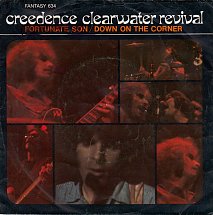
"Fortunate Son" is a song by the American rock band Creedence Clearwater Revival, released on the band's fourth studio album, Willy and the Poor Boys in October 1969. It was previously released as a single, together with "Down on the Corner", in September 1969. It soon became a Vietnam anti-war movement anthem and an expressive symbol of the counterculture's opposition to U.S. military involvement in the Vietnam War and solidarity with the soldiers fighting it. The song has been featured extensively in pop culture depictions of the Vietnam War and the anti-war movement.

"I Can See Clearly Now" is a song written and recorded by American singer-songwriter Johnny Nash. It was the lead single from his twelfth album, I Can See Clearly Now (1972), and achieved success in the United States and the United Kingdom when it was released in 1972, reaching number one on the US Billboard Hot 100 and Cash Box charts. It also reached number one in Canada and South Africa. The song has been covered by many artists throughout the years, including a hit version by Lee Towers that reached no. 19 in the Dutch Top 40 in 1982, and another recorded by Jimmy Cliff for the motion picture soundtrack of Cool Runnings that peaked at no. 18 on the US Billboard Hot 100 in 1993.
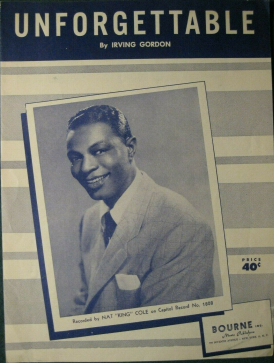
"Unforgettable" is a popular song written by Irving Gordon. The song's original working title was "Uncomparable,” however, the music publishing company asked Gordon to change it to "Unforgettable.” The song was published in 1951.
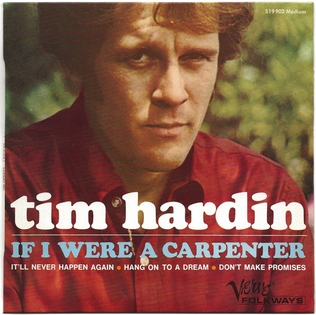
"If I Were a Carpenter" is a folk song written by Tim Hardin in the 1960s, and re-recorded with commercial success by various artists including Bobby Darin, The Four Tops and Johnny Cash. Hardin's own recording of the piece appeared on his 1967 album Tim Hardin 2. It was one of two songs from that release performed by Hardin at Woodstock in 1969. The song, believed by some to be about male romantic insecurity, is rumored to have been inspired by his love for actress Susan Morss, as well as the construction of Hardin's recording studio.

"Break It to Me Gently" is a pop song written by blues musician Joe Seneca with lyrics by Diane Lampert. Both Brenda Lee and Juice Newton were met with considerable success with their versions of the song.

"The Twelfth of Never" is a popular song written in 1956 and first recorded by Johnny Mathis the following year. The title is a popular expression, which is used as the date of a future occurrence that will never come to pass. In the case of the song, "the 12th of Never" is given as the date on which the singer will stop loving his beloved, thus indicating that he will always love him or her.

"Da Doo Ron Ron (When He Walked Me Home)" is a song written by Jeff Barry, Ellie Greenwich and Phil Spector. It first became a popular top five hit single for the American girl group the Crystals in 1963. American teen idol Shaun Cassidy recorded the song in 1977 and his version hit number one on the Billboard Hot 100 chart. There have also been many other cover versions of this song, including one by the songwriters Jeff Barry and Ellie Greenwich themselves, performing as the Raindrops.

"Mr. Lonely" is a song co-written and recorded by American singer Bobby Vinton, backed by Robert Mersey and his Orchestra. The song was first released on Vinton's 1962 album, Roses Are Red.

"Let's Twist Again" is a song written by Kal Mann and Dave Appell, and released as a single by Chubby Checker. One of the biggest hit singles of 1961, it reached No.8 on the U.S. Billboard pop chart in August of that year and subsequently reached No.2 in the UK in the spring of 1962. The song refers to the Twist dance craze and Checker's 1960 single "The Twist", a two-time U.S. No.1 single.
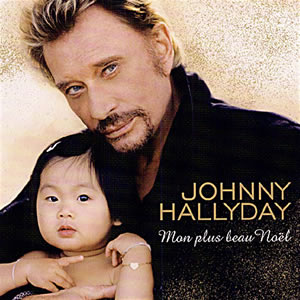
"Mon plus beau Noël" is a 2005 song recorded by French singer Johnny Hallyday. It was the second single on his album Ma Vérité on which it features as eighth track, and was released in December 2005 as a Christmas song. It was successful in Belgium (Wallonia), and particularly in France where it was Hallyday's third number-one single.

"Ya Ya" is a song by Lee Dorsey. The song was written by Dorsey, C. L. Blast, Bobby Robinson, and Morris Levy. Levy's participation in the writing has been called into question; the Flashback release of the single lists only Dorsey and Blast as writers, as do the liner notes to the American Graffiti soundtrack.

"Black Is Black" is a song by the Spanish rock band Los Bravos, released in 1966 as the group's debut single for Decca Records. Produced by Ivor Raymonde, it reached number two in the UK, number four in the US, and number one in Canada. With the recording's success, Los Bravos became the first Spanish rock band to have an international hit single. A dance remix was released as a single in 1986.
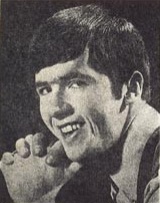
Branko Bernard Miler, better known by his stage name Tony Cole, was an Australian singer and songwriter.
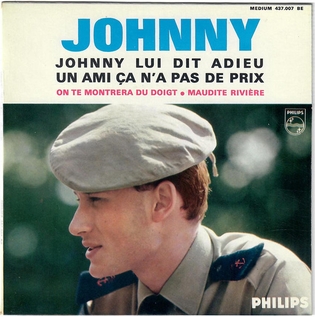
"Un ami ça n'a pas de prix" is a song by French singer Johnny Hallyday. It was released on an EP titled "Johnny lui dit adieu / Un ami ça n'a pas de prix" in January 1965.

"Makin' Love" is a song written and originally released by American country singer Floyd Robinson. He released it as a single in 1959 and was featured on his self-titled debut album the following year.

"Kili Watch" is a song originally recorded by the Belgian band The Cousins. They released it in October 1960. A French-language version by French singer Johnny Hallyday would follow one month later, having the same Chart success as the Cousins' original, charing simultaneously with the original.
"The Mosquito" is a song by American rock band the Doors from their 1972 album Full Circle. In the same year it was released as a single. Billboard called it an "unusual off beat disc" with a "clever Latin beat". Record World called it an "infectious ditty with calypso feel." The vocal is by Robby Krieger.

"We Say Yeah" is a song originally performed by Cliff Richard & The Shadows. It was initially released in December 1961 on "The Young Ones" soundtrack album and a few weeks later the B-side to "The Young Ones" single. Both reached number 1 in their respective UK charts. In France however, it was "We Say Yeah" instead of "The Young Ones" that made the singles chart, reaching number 14.




















